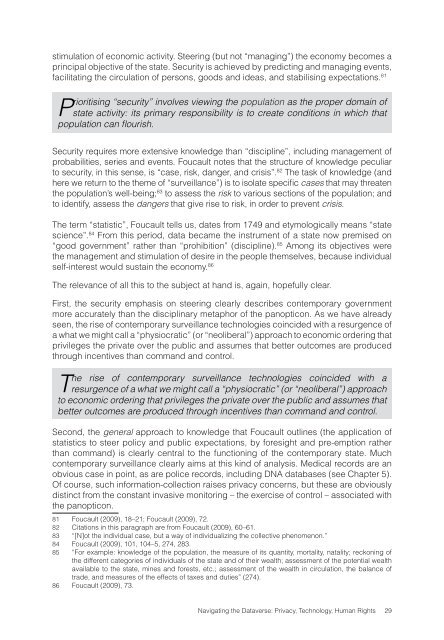Navigating the Dataverse: Privacy, Technology ... - The ICHRP
Navigating the Dataverse: Privacy, Technology ... - The ICHRP
Navigating the Dataverse: Privacy, Technology ... - The ICHRP
Create successful ePaper yourself
Turn your PDF publications into a flip-book with our unique Google optimized e-Paper software.
stimulation of economic activity. Steering (but not “managing”) <strong>the</strong> economy becomes a<br />
principal objective of <strong>the</strong> state. Security is achieved by predicting and managing events,<br />
facilitating <strong>the</strong> circulation of persons, goods and ideas, and stabilising expectations. 81<br />
Prioritising “security” involves viewing <strong>the</strong> population as <strong>the</strong> proper domain of<br />
state activity: its primary responsibility is to create conditions in which that<br />
population can flourish.<br />
Security requires more extensive knowledge than “discipline”, including management of<br />
probabilities, series and events. Foucault notes that <strong>the</strong> structure of knowledge peculiar<br />
to security, in this sense, is “case, risk, danger, and crisis”. 82 <strong>The</strong> task of knowledge (and<br />
here we return to <strong>the</strong> <strong>the</strong>me of “surveillance”) is to isolate specific cases that may threaten<br />
<strong>the</strong> population’s well-being; 83 to assess <strong>the</strong> risk to various sections of <strong>the</strong> population; and<br />
to identify, assess <strong>the</strong> dangers that give rise to risk, in order to prevent crisis.<br />
<strong>The</strong> term “statistic”, Foucault tells us, dates from 1749 and etymologically means “state<br />
science”. 84 From this period, data became <strong>the</strong> instrument of a state now premised on<br />
“good government” ra<strong>the</strong>r than “prohibition” (discipline). 85 Among its objectives were<br />
<strong>the</strong> management and stimulation of desire in <strong>the</strong> people <strong>the</strong>mselves, because individual<br />
self-interest would sustain <strong>the</strong> economy. 86<br />
<strong>The</strong> relevance of all this to <strong>the</strong> subject at hand is, again, hopefully clear.<br />
First, <strong>the</strong> security emphasis on steering clearly describes contemporary government<br />
more accurately than <strong>the</strong> disciplinary metaphor of <strong>the</strong> panopticon. As we have already<br />
seen, <strong>the</strong> rise of contemporary surveillance technologies coincided with a resurgence of<br />
a what we might call a “physiocratic” (or “neoliberal”) approach to economic ordering that<br />
privileges <strong>the</strong> private over <strong>the</strong> public and assumes that better outcomes are produced<br />
through incentives than command and control.<br />
<strong>The</strong> rise of contemporary surveillance technologies coincided with a<br />
resurgence of a what we might call a “physiocratic” (or “neoliberal”) approach<br />
to economic ordering that privileges <strong>the</strong> private over <strong>the</strong> public and assumes that<br />
better outcomes are produced through incentives than command and control.<br />
Second, <strong>the</strong> general approach to knowledge that Foucault outlines (<strong>the</strong> application of<br />
statistics to steer policy and public expectations, by foresight and pre-emption ra<strong>the</strong>r<br />
than command) is clearly central to <strong>the</strong> functioning of <strong>the</strong> contemporary state. Much<br />
contemporary surveillance clearly aims at this kind of analysis. Medical records are an<br />
obvious case in point, as are police records, including DNA databases (see Chapter 5).<br />
Of course, such information-collection raises privacy concerns, but <strong>the</strong>se are obviously<br />
distinct from <strong>the</strong> constant invasive monitoring – <strong>the</strong> exercise of control – associated with<br />
<strong>the</strong> panopticon.<br />
81 Foucault (2009), 18–21; Foucault (2009), 72.<br />
82 Citations in this paragraph are from Foucault (2009), 60–61.<br />
83 “[N]ot <strong>the</strong> individual case, but a way of individualizing <strong>the</strong> collective phenomenon.”<br />
84 Foucault (2009), 101, 104–5, 274, 283.<br />
85 “For example: knowledge of <strong>the</strong> population, <strong>the</strong> measure of its quantity, mortality, natality; reckoning of<br />
<strong>the</strong> different categories of individuals of <strong>the</strong> state and of <strong>the</strong>ir wealth; assessment of <strong>the</strong> potential wealth<br />
available to <strong>the</strong> state, mines and forests, etc.; assessment of <strong>the</strong> wealth in circulation, <strong>the</strong> balance of<br />
trade, and measures of <strong>the</strong> effects of taxes and duties” (274).<br />
86 Foucault (2009), 73.<br />
<strong>Navigating</strong> <strong>the</strong> <strong>Dataverse</strong>: <strong>Privacy</strong>, <strong>Technology</strong>, Human Rights 29
















